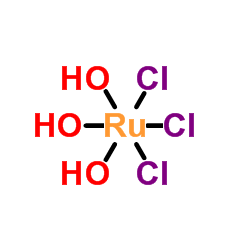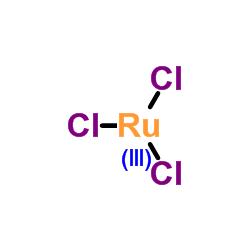13815-94-6
| 中文名 | 三水氯化钌 |
|---|---|
| 英文名 | Ruthenium(III) chloride trihydrate |
| 中文别名 | 二氯化钌(III) |
| 英文别名 |
Ruthenium(6+) chloride hydroxide (1:3:3)
Ruthenium(III) Chloride Trihydrate trichlororuthenium,trihydrate Ruthenium(III)Chloride |
| 分子式 | Cl3H6O3Ru |
|---|---|
| 分子量 | 258.451 |
| 精确质量 | 257.819153 |
| PSA | 27.69000 |
| LogP | 1.87560 |
| 外观性状 | 固体 |
| 储存条件 | 室温,密封,干燥 |
Synonym:None Section 2 - COMPOSITION, INFORMATION ON INGREDIENTS
Risk Phrases: 34 Section 3 - HAZARDS IDENTIFICATION EMERGENCY OVERVIEW
Causes burns.Hygroscopic (absorbs moisture from the air).Corrosive. Potential Health Effects Eye: Causes eye burns. Skin: Causes skin burns. Ingestion: May cause severe and permanent damage to the digestive tract. Causes gastrointestinal tract burns. Inhalation: Causes chemical burns to the respiratory tract. Chronic: No information found. Section 4 - FIRST AID MEASURES Eyes: Get medical aid immediately. Do NOT allow victim to rub eyes or keep eyes closed. Extensive irrigation with water is required (at least 30 minutes). Skin: Get medical aid immediately. Immediately flush skin with plenty of water for at least 15 minutes while removing contaminated clothing and shoes. Wash clothing before reuse. Destroy contaminated shoes. Ingestion: Do not induce vomiting. If victim is conscious and alert, give 2-4 cupfuls of milk or water. Get medical aid immediately. Inhalation: Get medical aid immediately. Remove from exposure and move to fresh air immediately. If not breathing, give artificial respiration. If breathing is difficult, give oxygen. Do NOT use mouth-to-mouth resuscitation. If breathing has ceased apply artificial respiration using oxygen and a suitable mechanical device such as a bag and a mask. Notes to Physician: Section 5 - FIRE FIGHTING MEASURES General Information: As in any fire, wear a self-contained breathing apparatus in pressure-demand, MSHA/NIOSH (approved or equivalent), and full protective gear. During a fire, irritating and highly toxic gases may be generated by thermal decomposition or combustion. Extinguishing Media: Use agent most appropriate to extinguish fire. Use water spray, dry chemical, carbon dioxide, or appropriate foam. Section 6 - ACCIDENTAL RELEASE MEASURES General Information: Use proper personal protective equipment as indicated in Section 8. Spills/Leaks: Vacuum or sweep up material and place into a suitable disposal container. Clean up spills immediately, observing precautions in the Protective Equipment section. Avoid generating dusty conditions. Provide ventilation. Section 7 - HANDLING and STORAGE Handling: Wash thoroughly after handling. Remove contaminated clothing and wash before reuse. Minimize dust generation and accumulation. Avoid contact with eyes, skin, and clothing. Keep container tightly closed. Avoid ingestion and inhalation. Use with adequate ventilation. Discard contaminated shoes. Storage: Store in a cool, dry place. Keep container closed when not in use. Corrosives area. Store protected from moisture. Section 8 - EXPOSURE CONTROLS, PERSONAL PROTECTION Engineering Controls: Facilities storing or utilizing this material should be equipped with an eyewash facility and a safety shower. Use adequate ventilation to keep airborne concentrations low. Exposure Limits CAS# 13815-94-6: Personal Protective Equipment Eyes: Wear appropriate protective eyeglasses or chemical safety goggles as described by OSHA's eye and face protection regulations in 29 CFR 1910.133 or European Standard EN166. Skin: Wear appropriate protective gloves to prevent skin exposure. Clothing: Wear appropriate protective clothing to minimize contact with skin. Respirators: A respiratory protection program that meets OSHA's 29 CFR 1910.134 and ANSI Z88.2 requirements or European Standard EN 149 must be followed whenever workplace conditions warrant respirator use. Section 9 - PHYSICAL AND CHEMICAL PROPERTIES Physical State: Crystalline powder Color: black Odor: Not available. pH: Not available. Vapor Pressure: Not available. Viscosity: Not available. Boiling Point: Not available. Freezing/Melting Point: Not available. Autoignition Temperature: Not applicable. Flash Point: Not applicable. Explosion Limits, lower: Not available. Explosion Limits, upper: Not available. Decomposition Temperature: Solubility in water: Specific Gravity/Density: Molecular Formula: Cl3Ru.3H2O Molecular Weight: 261.47 Section 10 - STABILITY AND REACTIVITY Chemical Stability: Stable under normal temperatures and pressures. Conditions to Avoid: Incompatible materials, dust generation, excess heat, strong oxidants, exposure to moist air or water. Incompatibilities with Other Materials: Moisture, zinc. Hazardous Decomposition Products: Irritating and toxic fumes and gases, oxides of chlorine, ruthenium oxide. Hazardous Polymerization: Has not been reported Section 11 - TOXICOLOGICAL INFORMATION RTECS#: CAS# 13815-94-6 unlisted. LD50/LC50: Not available. Carcinogenicity: Ruthenium(III) Chloride Trihydrate - Not listed by ACGIH, IARC, or NTP. Section 12 - ECOLOGICAL INFORMATION Section 13 - DISPOSAL CONSIDERATIONS Dispose of in a manner consistent with federal, state, and local regulations. Section 14 - TRANSPORT INFORMATION IATA Shipping Name: CORROSIVE SOLID, N.O.S.* Hazard Class: 8 UN Number: 1759 Packing Group: III IMO Shipping Name: CORROSIVE SOLID, N.O.S. Hazard Class: 8 UN Number: 1759 Packing Group: III RID/ADR Shipping Name: CORROSIVE SOLID, N.O.S. Hazard Class: 8 UN Number: 1759 Packing group: III Section 15 - REGULATORY INFORMATION European/International Regulations European Labeling in Accordance with EC Directives Hazard Symbols: C Risk Phrases: R 34 Causes burns. Safety Phrases: S 25 Avoid contact with eyes. S 28 After contact with skin, wash immediately with... S 36/37/39 Wear suitable protective clothing, gloves and eye/face protection. WGK (Water Danger/Protection) CAS# 13815-94-6: No information available. Canada None of the chemicals in this product are listed on the DSL/NDSL list. CAS# 13815-94-6 is not listed on Canada's Ingredient Disclosure List. US FEDERAL TSCA CAS# 13815-94-6 is not on the TSCA Inventory because it is a hydrate. It is considered to be listed if the CAS number for the anhydrous form is on the inventory (40CFR720.3(u)(2)). SECTION 16 - ADDITIONAL INFORMATION N/A |
| 符号 |

GHS05 |
|---|---|
| 信号词 | Danger |
| 危害声明 | H314 |
| 警示性声明 | P280-P305 + P351 + P338-P310 |
| 个人防护装备 | Eyeshields;Faceshields;full-face particle respirator type N100 (US);Gloves;respirator cartridge type N100 (US);type P1 (EN143) respirator filter;type P3 (EN 143) respirator cartridges |
| 危害码 (欧洲) | C: Corrosive; |
| 风险声明 (欧洲) | R34 |
| 安全声明 (欧洲) | 26-27-36/37/39 |
| 危险品运输编码 | UN 3260 |
| 包装等级 | Ⅱ |
|
~% 
13815-94-6 
13815-94-6 |
| 文献:Journal of the American Chemical Society, , vol. 82, p. 4187 - 4191 C. A., UCRL-9059 (1960), S. 1/81 , vol. 56, p. 13776 |
|
~% 
13815-94-6 |
| 文献:Inorganic Chemistry, , vol. 4, p. 1414 - 1416 Ru: SVol., 88, page 283 - 285 |

13815-94-6 ~% 
13815-94-6 |
| 文献:Ru: SVol., 89, page 285 - 288 |
| 上游产品 4 | |
|---|---|
| 下游产品 1 | |




